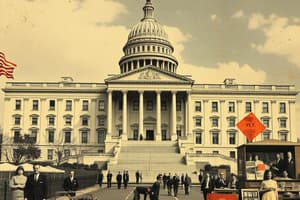Podcast
Questions and Answers
What is the House of Representatives?
What is the House of Representatives?
- Representatives elected by each state based on population size (correct)
- A legislative body with equal representation from each state
- An advisory committee to the President
- The upper chamber of Congress
What is the key feature of the Senate?
What is the key feature of the Senate?
- Elected based on a state's population
- Only serves a two-year term
- Each state has one representative
- Two representatives from each state (correct)
What does bicameral mean?
What does bicameral mean?
A legislature divided into two houses
What is gerrymandering?
What is gerrymandering?
What is the purpose of a census?
What is the purpose of a census?
What is redistricting?
What is redistricting?
What is reapportionment?
What is reapportionment?
What characterizes a two-party system?
What characterizes a two-party system?
What are single member districts?
What are single member districts?
What does entitlements refer to?
What does entitlements refer to?
What is legislative intent?
What is legislative intent?
What did the Civil Rights Act of 1964 accomplish?
What did the Civil Rights Act of 1964 accomplish?
What is the Americans with Disabilities Act of 1990?
What is the Americans with Disabilities Act of 1990?
What are amendments?
What are amendments?
What is mandatory spending?
What is mandatory spending?
What is discretionary spending?
What is discretionary spending?
What is a filibuster?
What is a filibuster?
What is the incumbency effect?
What is the incumbency effect?
What is the franking privilege?
What is the franking privilege?
What is the legislative veto?
What is the legislative veto?
Who is the Speaker of the House?
Who is the Speaker of the House?
What is the role of the Majority Leader?
What is the role of the Majority Leader?
What is a Whip in Congress?
What is a Whip in Congress?
What was the Voter Revolution of 1994?
What was the Voter Revolution of 1994?
What does the Rules Committee do?
What does the Rules Committee do?
What is meant by plurality in elections?
What is meant by plurality in elections?
What is fiscal policy?
What is fiscal policy?
What is monetary policy?
What is monetary policy?
Flashcards are hidden until you start studying
Study Notes
Legislative Structure
- House of Representatives: Membership varies by state population; larger states have more representatives, enhancing their influence.
- Senate: Each state has two senators, which benefits smaller states by ensuring equal representation.
- Bicameral System: The U.S. Congress consists of two houses; all U.S. state legislatures are also bicameral, except for Nebraska.
Political Processes
- Gerrymandering: The process of manipulating congressional district boundaries to favor a particular political party.
- Census: Conducted every ten years to provide demographic data; essential for legislative representation.
- Redistricting: Adjusting district boundaries post-census to reflect population changes and ensure equal representation.
- Reapportionment: Redistribution of House seats every decade based on census results.
Voting and Representation
- Two-party System: Although multiple parties exist, only two dominant parties typically compete in elections.
- Single-member Districts: Each electoral district elects one representative, simplifying candidate choices for voters.
Legislative Framework
- Entitlements: Programs requiring government funding at set levels, such as Social Security, with obligated payments to recipients.
- Legislative Intent: Courts consider the purpose behind laws to clarify ambiguous legislation during interpretation.
Landmark Legislation
- Civil Rights Act of 1964: Prohibits racial discrimination in public accommodations and employment, a cornerstone of civil rights.
- Americans with Disabilities Act of 1990: Mandates reasonable accommodations for individuals with disabilities in employment and public spaces.
Financial Management
- Mandatory Spending: Government expenditures mandated by existing laws without the need for annual appropriations.
- Discretionary Spending: Budget allocations determined through annual appropriations; includes discretionary programs and government operations.
Legislative Strategies
- Filibuster: Senate tactic allowing prolonged debate to delay or block legislation; highlights the unique procedural rules of the Senate.
- Incumbency Effect: The advantage current officeholders have in reelection due to established networks and recognition.
- Franking Privilege: Allows Congress members to send mail to constituents without postage costs, facilitating communication and outreach.
Congressional Leadership
- Speaker of the House: The elected leader within the House, responsible for legislative agenda and second in presidential succession.
- Majority Leader: Assists the Speaker, manages legislative scheduling, and orchestrates party strategy.
- Whip: Party leader focusing on vote counting and persuading party members to support legislation.
Political Events
- Voter Revolution of 1994: Significant Republican gains during the midterm elections led by Newt Gingrich, altering the political landscape.
- Rules Committee: Establishes the parameters of debate for bills in the House, influencing legislative procedures.
Voting Dynamics
- Plurality: Winning the most votes does not require an absolute majority; essential in understanding electoral outcomes.
Economic Policies
- Fiscal Policy: Influences the economy through government spending, taxation, and budget decisions, driven by Congress and the president.
- Monetary Policy: Manages the money supply to regulate the economy, primarily through actions by the Federal Reserve.
Studying That Suits You
Use AI to generate personalized quizzes and flashcards to suit your learning preferences.




